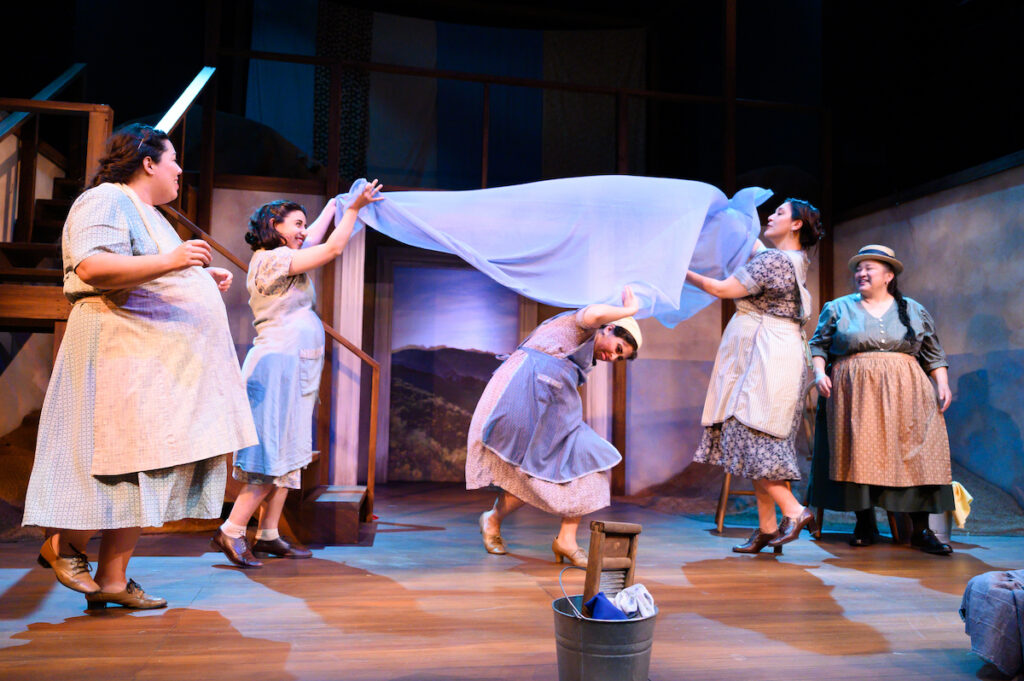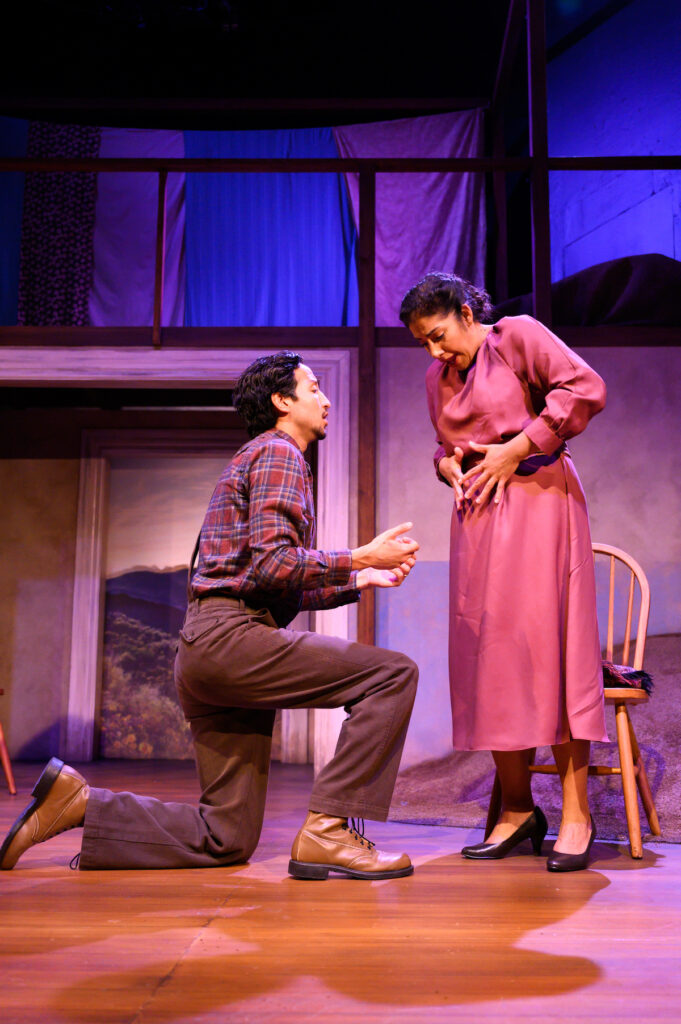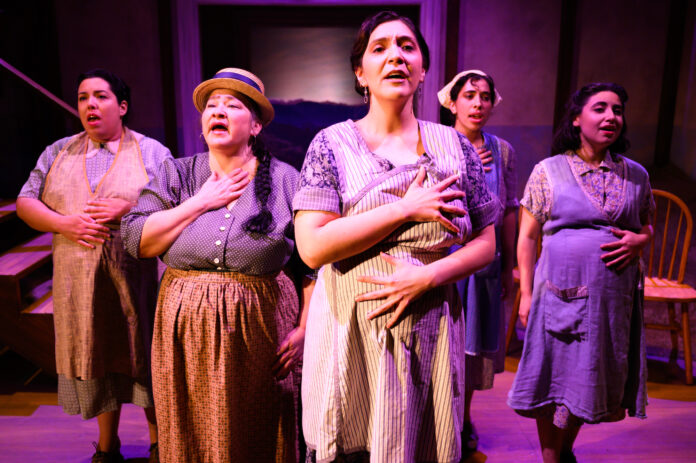By the end of two-hour runtime of Yerma (West Coast premiere through Sun/18 at the Ashby Stage, Berkeley), it wasn’t surprising to me to have hear the word “insane” bandied about. What shocked me was the fact that the word was spoken by one patron to another. I’ll get to why in a minute, but this pre-curtain act—a male patron saying it to a woman—almost seemed to foreshadow the play’s depiction of dismissing a woman’s concerns as simply “hysteria” (a loaded word if ever there was one).
The eponymous lead of Federico García Lorca’s 1934 play (brought to visceral life by the always great Regina Morones) is a woman who seems to have everything. The wife of wealthy landowner Juan (Caleb Cabrera, in one of his better performances), Yerma is admired by both her husband’s employees and the women of the town, many of whom she grew up with. The only thing she sees missing is a child—and everyone has an opinion about that, several of them faulting Yerma herself.
Juan thinks she wants it too much and should just be happy with the luxury they already have. Many of the women think she just isn’t trying hard enough, as evidenced by many of her peers already bearing several. She’s given every recommendation, from visiting a bruja to having an affair with handsome former boyfriend Victor (Samuel Prince). When you’re that consumed with an idea, it’s only a matter of time before you take extreme measures to see it through.
With its script newly translated by Melinda Lopez and direction by Katja Rivera, Shotgun’s production of Yerma only benefits from such defined feminine perspectives. Lorca, who was assassinated for being a gay Socialist in the lead-up to the Spanish Civil War, was often praised for being a male writer who presented complex portraits of women—something also common in the work of one of his creative offspring, openly gay Spanish film-maker Pedro Almodóvar. Yet the best of intentions are no substitute for the actual perspective of the type of person being portrayed.

Lopez and Rivera fill their show with women’s empathy just as much as they deploy the female gaze. The latter has the introduction of the handsome Victor seeming to stop time itself with his mere appearance, the former keeps the conversations of the ensemble grounded when another director would have played up the women as venomous, catty shrews. Instead, crucial scenes in which the ensemble (led by a scene-stealing Linda Amayo-Hassan as Incarnación, with Mylo Cardona, Linda Maria Girón, Aisha Rivera, and Alejandra Wahl) talk among themselves go far to inform both Yerma’s longing for a child and Juan’s paranoia over town gossip.
We see both as far more complex than they would be otherwise. Several of the women are Yerma’s friends and confidantes, but it isn’t always clear whether or not they’re playing the same characters when they’re subsumed into the group, which seems to be the point: They’re both inside and outside of the very goings-on they can’t stop talking about.
Adding to the atmosphere is the score by sound designer Sebastian Gutierrez. It turns Lorca’s Lopez-translated words into literal lyricism by making them songs, revelations of Yerma’s inner thoughts, and of a supernatural world that seems to beckon her towards it. And why not, when she’s already tried every secular option with no child to show for it? As the cast glides across Nina Ball’s pueblo set with Natalie Greene’s choreography, there’s an air of magical realism to Rivera’s production that compliments the characters’ spiritual nature.
In one of the early scenes, Yerma and whomever-she’s-conversing-with humorously cross themselves after nearly every mention of God. Near the climax, the frightening appearance of a demon is a surreal as it is heartbreaking. How much one informs the other is up to you.
Yerma’s story begins where “Happily ever after” ends, until it becomes a straight-out horror story. Every moment of it is captivating—even as we aren’t sure whether or not she’s losing her mind.

Which bring me to the “insane” incident: as we all took our seats before the start of this masked matinée, the man seated in front of me coughed from behind his (thankfully, KN95) mask, prompting the woman next to him to ask if he was well. He asked why she asked. She replied “You know COVID is a thing, right?”
The incredulous man scoffed, “Are you serious?! You’re insane!”
The woman flagged an usher to tell on this asshole (who denied saying what we all heard him say), and the usher asked if either would like to change seats. They both kept their spots as a seeming act of defiance toward one another. The guy would later joke about the woman to his companion as I resisted the urge to go off on him (Black folks have to be cautious about how they confront white people in public), but I was glad the usher was sympathetic to the woman during intermission, telling her “We’re still in a pandemic” to illustrate how serious he was about the masking policy.
(During that same intermission, Shotgun AD Patrick Dooley unexpectedly approached me to say they’re updating the Ashby’s HVAC system to improve its functionality by their next show. He said he’d felt the need after recently implementing Aranet monitors—even asking me if I’d heard of the company. In fact, I’d brought the same one I’ve been using for over a year, for which the CO² levels peaked around 1926ppm by the end of this show.)
This “insane” incident may have informed the “hysterical woman” cultural misogyny that the show itself examines, but I’m also glad it didn’t deter from the show itself. Yerma is a technically brilliant show anchored by solid direction of a fine ensemble. It’s unfortunate that the sexism it tackles is just as potent nearly a century later, but this production is a refreshing POV take on the very women forced to shoulder all the burdens of a myopic world of men.
YERMA runs through Sun/18 at the Ashby Stage, Berkeley. Tickets and further info here.






